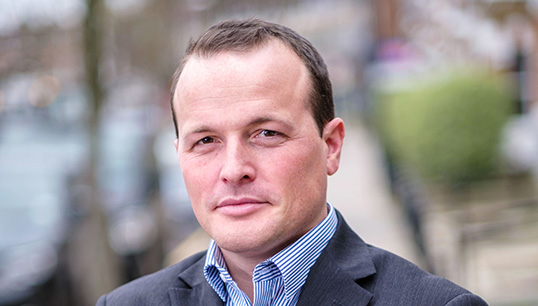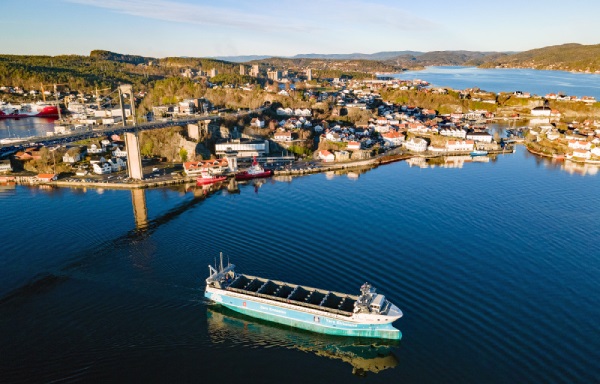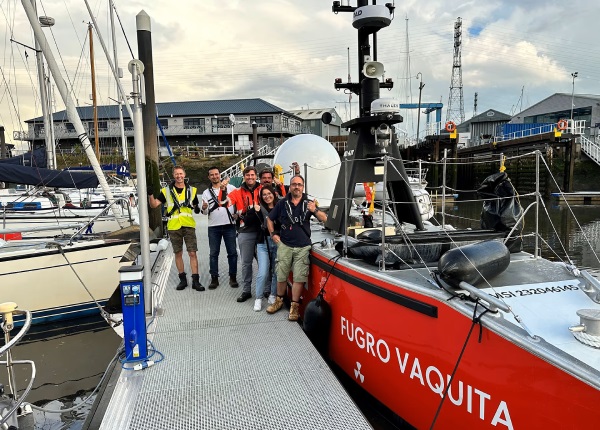- Topics
- Campaigning
- Careers
- Colleges
- Community
- Education and training
- Environment
- Equality
- Federation
- General secretary message
- Government
- Health and safety
- History
- Industrial
- International
- Law
- Members at work
- Nautilus news
- Nautilus partnerships
- Netherlands
- Open days
- Opinion
- Organising
- Podcasts from Nautilus
- Sponsored content
- Switzerland
- Technology
- Ukraine
- United Kingdom
- Welfare

The October 2024 meeting of the Nautilus Professional and Technical Forum focused on the development of Marine Autonomous Surface Ships, or MASS. Here is a round-up of the information provided by head of professional and technical David Appleton in his presentation to the Forum, incorporating the answers to questions members asked on the day.
How it started
Seven or eight years ago, there was a great deal of talk about how MASS was the future, with suggestions of crewless containerships crossing the world and implications that seafarers could be out of a job.
Maritime tech firms such as Rolls-Royce and Kongsberg predicted that by 2020 we'd have commercial use of autonomous vessels in local waters, particularly tugs and ferries. Oceangoing autonomous vessels would be seen by 2025, and autonomous deepsea cargo vessels would be a common sight by 2030.
What actually happened
Development has continued on autonomous ships – or largely on what might more correctly be termed remote-controlled ships. However, we are not seeing implementation on the scale envisaged in 2016, and even the best-known remote-controlled vessel, the Yara Birkeland, is still operating with a small crew of two or three onboard.

There are now a few genuinely autonomous ships, but these are small vessels used for a specific limited purpose. For example, the Fugro Vaquita – a 12 metre-long uncrewed surface vessel (USV) – has recently secured category zero approval by the UK Maritime & Coastguard Agency (MCA), and has been deployed on an offshore wind farm in Scotland to take on fully-autonomous survey work.
What's holding things up?
The development of the technology has proved more challenging than anticipated, especially when it came to real-world trials. There have also been safety concerns relating to watchkeeping and collision avoidance, and more work is needed to update regulations, both nationally and internationally.
Seafarers' representatives – including Nautilus – have pointed out the problems with shipping companies trying to replace crews of highly-trained and experienced officers with cheaper alternatives. These suggested alternatives range from artificial intelligence to lone shipmasters operating several ships at once through a remote-control centre. From a Union perspective, the potential loss of good jobs is a concern, but members' safety is just as important.
We should say at this point that Nautilus is not opposing the move to MASS, as there could be benefits to seafarers such as automating mundane tasks and providing more family-friendly jobs in remote-control centres. However, we are determined to make sure the transition to new ways of working is ethical and safe.

The USV Fugro Vaquita. Image: Fugro
What is the IMO doing?
Nautilus is in a strong position to report on this, as we have input into regulatory work at the International Maritime Organization (IMO).
We started work on this in 2017. Following a proposal from the UK and other interested flag states, the IMO undertook a 'regulatory scoping exercise', reviewing and assessing existing regulations to determine whether or not each one allowed for the operation of autonomous vessels, whether it prohibited the operation of autonomous vessels, or whether it needed modifying to allow for the operation of autonomous vessels.
This exercise was completed in 2021. In 2022, work started to develop a non-mandatory code to allow for the operation of MASS vessels covered by the SOLAS Convention – i.e. those over 500gt on international voyages. Nautilus has taken a very active part in that through our affiliations with the International Transport Workers' Federation (ITF) and IFSMA – the International Federation of Shipmasters' Associations. The non-mandatory code is due for completion in 2025, with the idea of eventually making the code mandatory.
All this work has been progressing more slowly than anticipated, and there is still disagreement on how to define MASS. We have also expressed concerns that some stakeholders' voices seem to carry more weight than others in the discussions.
What are national regulators doing?
Bearing in mind the slow progress at the IMO, and how the code being developed isn't necessarily going to take in the small MASS vessels in existence now, there has been significant work nationally to advance the regulatory regime in the UK and the Netherlands.
In the UK, a body called MARLab was established in 2018 with the aim of addressing the gaps that exist in legislation for MASS. An extensive consultation exercise last year led to recommendations of changes to national legislation and the proposal for a comprehensive national framework to allow for the operation of MASS in national waters.
The UK Work Boat Code has been updated and now contains provisions to cover remote control vessels under 24 metres. Another project involving Nautilus has been the development of a competency framework for remote operators. The MCA has recently published the M-notice MGN 703, which sets out information regarding the training and certification of remote operators.
Similar work has been going on in the Netherlands. In 2017, the joint industry project on autonomous shipping was initiated, which involved 17 partners in the Netherlands investigating autonomous technologies and also regulatory and other barriers to adoption.
The Netherlands Maritime Technology Foundation has been coordinating efforts to develop safety plans and criteria for sea trials, which have been adopted and approved, and the Dutch government has been participating very extensively in the work at the IMO as well.
Specific projects in the Netherlands have included sea trials of various autonomous navigation systems, including systems that can be retrofitted to existing vessels.
What else is happening internationally?
Both the UK and the Netherlands have been taking part in cooperative initiatives among northern European countries, with a memorandum of understanding on MASS being agreed for the North Sea nations Belgium, Denmark, the Netherlands, Norway and the UK. These countries are seeking to simplify the operation of autonomous ships in the North Sea, ensuring that national regulatory frameworks will align with each other.
We are strong supporters of this kind of international cooperation, as it makes it more likely that the move to MASS will provide benefits to seafarers rather than putting their safety at risk.
Conclusion
All the work that has been done to date on MASS technology and regulation has led to a general feeling among stakeholders that many vessels are unlikely ever to be fully automated or remote-controlled. Seafarers will probably always be needed onboard passenger ships for emergency evacuations, and on large cargo ships for port operations, for example.
There are also thorny legal issues still to tackle about whether it should be permissible to operate large vessels without the master onboard, and who would be liable in the case of an accident or pollution incident.
However, certain MASS vessels are seen as a positive development for the maritime industry and national economies. This is because at a small scale – such as for survey work – automation would make certain businesses commercially viable where they may have struggled to operate with a full-sized crew onboard.
We at Nautilus will continue to keep a very close eye on the situation, of course. We will continue to participate in the work around MASS nationally and internationally, and ensure that the seafarer's point of view is considered at all times.
- The Nautilus Professional and Technical Forum is held three times a year, and is an opportunity for members to hear P&T updates from the Union, ask questions and share their own expertise. To attend the next Forum in early 2025, members should keep an eye on the Events section of this website and look out for their email invitation nearer the time
Tags
